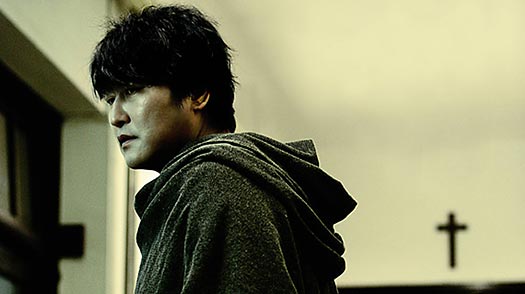
Song Kang-ho in Thirst
If you're going to do a love story, make it a mad love story. Get down into the essentials: ecstasy, pain and all the bodily fluids, especially blood. Park Chan-wook, best known to DVD connoisseurs for his Vengeance trilogy, is a past master of emotional violence. He's the soul of South Korea's vigorous, not to say kinky, psychological action movies. And Thirst — with its irresistible one-line sales pitch: a priest becomes a vampire — is his richest, craziest, most mature work yet.
Father Sang-hyun (Korean superstar Song Kang-ho) is a Catholic priest who's both caring and modern. He intones the last rites over terminally ill patients at the local hospital, and in confession he gives one troubled nurse the penance of 20 Hail Marys, a walk in the sun and a recommendation to take antidepressants. He is also a serious flagellant, whipping his thighs in mortification to suppress sexual urges. (Park's Oldboy also boasted more than its share of self-mutilation.) He has a Christ-like desire to save the world through suffering, and that vocation leads him into a medical experiment with dire effects: everyone else who's undergone it has died. (See pictures of the Cannes 2009 Red Carpet.)
The experiment — makes no sense, doesn't matter, this is a horror movie — is one he somehow survives, making him a figure of veneration to a small cult believing he can cure all ailments. That's the hope of Father Hyun's feeble school chum Kang-woo (Shin Ha-kyun), who lives with his termagant mom (Kim Hae-sook) and his strangely silent, sullen young wife Tae-ju (Kim Ok-vin). What the family doesn't know is that the good father has picked up a little side effect of the experiment: vampirism. The condition's benefits — he can bend lampposts, scale high walls — don't always outweighs its liabilities. The food supply he needs is hard to find in the local market. So, as you walk unawares into a hospital room, you might find a man in a collar and cassock supine on the floor, sucking the blood from a patient's IV bottle.
Turns out that Tae-ju is just the woman for this virgin vampire. In one long scene of sexual tension, she kisses Hyun and nearly seduces him; in another, he acknowledges both her attractiveness and his rapacious new nature and they consummate their relationship, one whose ecstatic excess will define the rest of the film. Their love is both sacred and insane: sacra-Mental. And the movie — whose French title translates as the liturgically evocative "This Is My Blood" — goes mad with them. It's liberating to watch a film that melds with the obsessions of its characters, that strips the moorings from genre expectations and leaves viewers asking whether the film has lost its mind or they have. Our advice to those who see Thirst in its U.S. release later this year: when Thirst goes nuts, go with it. (See the top 10 Cannes Film Festival movies of all time.)
Song Kang-ho has starred in many of the films that mark the Korean renaissance: Shiri, The Foul King, Memories of Murder, The Host, Secret Sunshine and Park's Joint Security Area, Sympathy for Mr. Vengeance and Lady Vengeance. The actor's trademark stolidity, which lends itself equally well to deadpan comedy and high-voltage macho roles, is a suitable vessel for Father Hyun's stoic battle against the impulses that have invaded his system. But it's the lovely Kim, just 22, who is the revelation here. She can play — no, she can be — a creature of mute docility, then searching ardor, then explosive eroticism, then murderous intent. She is Lady Chatterley and Lady Macbeth in one gorgeous, smoldering package.
Blending plot elements of Double Indemnity and Natural Born Killers with the ripe sensuality of Francis Coppola's take on Dracula, the film has made festival critics sit up in startled pleasure, as if they'd just received the most luscious neck-bite. It's almost guaranteed to get an important citation on closing night. Park's Oldboy won the Grand Jury Prize, the second-place award here at Cannes, in 2004. On its merits, Thirst should do better.